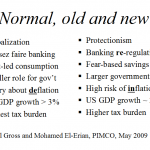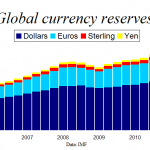The bad news is that the United States – indeed, much of the developed world – is in the midst of a “contained depression.” The private sector continues to de-leverage. Unemployment remains high. Pay for most is static or declining. Deflation remains a bigger threat than inflation. Depressions eventually end, [continue reading . . . ]

Mohamed El-Erian and Bill Gross of Pacific Investment Management Company (Pimco), the world’s largest fixed-income manager, to the best of my knowledge originated the phrase “new normal” to indicate that things fundamentally changed following the Panic of September 2008 and its aftermath. After studying a number of their writings, freely [continue reading . . . ]
The U.S. is in such dire financial shape that it must raise taxes on the middle class as well as the rich AND curtail, via means-testing, giant entitlement programs, including Social Security and Medicare. That’s the Easter Sunday sermon from supply-side guru and former OMB director David A. Stockman via [continue reading . . . ]
Will the bond market tank when the Fed stops buying Treasury paper in a few weeks? As reported in today’s Wall Street Journal, two of the biggest players in the fixed-income market are at polar opposites. They both can’t be right. As I told a friend today, this is why [continue reading . . . ]

Is the dollar’s long run as the global reserve currency coming to an end? It is if the Chinese have anything to say about it. China owns the globe’s largest store of dollar-denominated assets outside the U.S. Understandably, it wants to diversify. The world needs an “international reserve currency that [continue reading . . . ]
Richard W. Stevenson writes in Sunday’s New York Times Week in Review section that the debate in Washington over spending, debt, deficits and entitlements amounts to the most fundamental reassessment of the size and role of government since Ronald Reagan and perhaps since Franklin Roosevelt. Here’s an excerpt: The battle [continue reading . . . ]
Canadian taxes, S&P’s warning that it might downgrade U.S. debt and Zillow’s proposed public offering were the my principal topics on Weekday on KUOW today. Earlier in the hour, Weekday host Steve Scher and Vancouver Sun political correspondent Vaughn Palmer had discussed why Canadians pay much higher prices for everday [continue reading . . . ]
Richard W. Stevenson writes in Sunday’s New York Times Week in Review section that the debate in Washington over spending, debt, deficits and entitlements amounts to the most fundamental reassessment of the size and role of government since Ronald Reagan and perhaps since Franklin Roosevelt. The battle ahead “is the [continue reading . . . ]
Don’t miss Mohamed El-Erian’s latest column in the Financial Times. I’ve posted a brief excerpt in the Food for Thought section.
from Harvard professor Kenneth Rogoff in the Financial Times, April 5, p. 13 Even if today’s government bonds seem pristine by the standards of pre-revolutionary France, future scholars will see our tax systems as Byzantine labyrinths funnelling money to powerful interests, creating staggering inefficiencies. They will surely be incredulous to [continue reading . . . ]